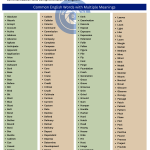Ways to Say “No Problem”
People often say ‘No problem,’ but it isn’t always the most professional choice. This phrase is commonly used to respond to requests, express understanding, or show agreement. While there’s nothing inherently wrong with using it, having alternative expressions can be useful, especially in professional settings.
List of Ways To Say “No Problem”
Need a casual way to say “no problem” in English? Here are a few common phrases you can use:
Informal Expressions:
- No problem: This is the most straightforward and common way to say it.
- No worries: This implies that you’re not concerned about the situation.
- Don’t worry about it: This reassures the other person that the issue isn’t a big deal.
- No sweat: This is a more casual way to say “no problem.”
- Piece of cake: This suggests that the task is easy.
- Not a problem at all: This is a more emphatic way to say “no problem.”
- Sure thing: This indicates agreement and willingness to help.
More Formal Expressions:
- Certainly: This is a polite and formal way to agree.
- Of course: This is another formal way to say “yes, no problem.”
- By all means: This is a more emphatic way to say “of course.”
- With pleasure: This indicates that you’re happy to help.
Casual Ways:
- No worries.
- You’re welcome.
- It’s nothing.
- Don’t mention it.
- Anytime.
- No big deal.
- Sure thing.
- No sweat.
- All good.
- It’s chill.
Polite or Formal Ways:
- My pleasure.
- Happy to help.
- You’re most welcome.
- Glad to assist.
- Not a bother at all.
Friendly Responses:
- No probs.
- It’s cool.
- De nada (Spanish-inspired, informal).
- Absolutely.
- That’s okay.
Idiomatic Expressions for “No Problem”
- No sweat – Suggests that the task or favor was effortless.
- Piece of cake – Indicates that something was very easy to handle.
- Happy to oblige – Shows willingness to assist without inconvenience.
- All in a day’s work – Implies that the task is a routine part of one’s responsibilities.
- Don’t give it a second thought – Encourages the other person not to worry about the favor.
- Glad to lend a hand – Expresses joy in being helpful.
- Water under the bridge – Suggests there’s no need to dwell on any issues.
- No harm, no foul – Implies there’s nothing to worry about as no damage was done.
- By all means – Indicates readiness and agreement to help.
- That’s what friends are for – Highlights the naturalness of helping someone.
Examples of “No Problem”
Here are short conversations demonstrating different ways to say “No problem”:
Casual Setting
A: Thanks for grabbing me a coffee!
B: No worries!
Workplace Interaction
A: Could you send me the report by noon?
B: Sure thing.
Polite Exchange
A: I really appreciate you staying late to help out.
B: Happy to help!
Friendly Gesture
A: Sorry for making you wait.
B: It’s all good.
Professional Setting
A: Thanks for fixing the issue so quickly.
B: My pleasure!
“No Problem” in Different Languages
No Problem In French
- Pas de problème
(No problem) - Pas de souci
(No worries) - Avec plaisir
(With pleasure) - Ce n’est rien
(It’s nothing) - Aucun souci
(No trouble at all)
No Problem In Spanish
- No hay problema
(No problem) - No te preocupes
(Don’t worry) - De nada
(You’re welcome) - No pasa nada
(It’s nothing / No worries) - Con gusto
(With pleasure) - Ningún problema
(No trouble at all)
No Problem In Korean
- 문제 없어요 (munje eopseoyo)
(No problem) - 걱정하지 마세요 (geokjeonghaji maseyo)
(Don’t worry) - 괜찮아요 (gwaenchanayo)
(It’s okay / No worries) - 별거 아니에요 (byeolgeo anieyo)
(It’s nothing / It’s no big deal) - 천만에요 (cheonmaneyo)
(You’re welcome – formal)
No Problem In Chinese
- 没问题 (méi wèn tí)
(No problem) - 不用担心 (bú yòng dān xīn)
(Don’t worry) - 没事 (méi shì)
(It’s nothing / No worries) - 没关系 (méi guān xi)
(It doesn’t matter / No problem) - 不客气 (bú kè qì)
(You’re welcome – polite)
Remember to choose the appropriate phrase based on the context of the situation and your relationship with the other person.
Download Word Coach Application





